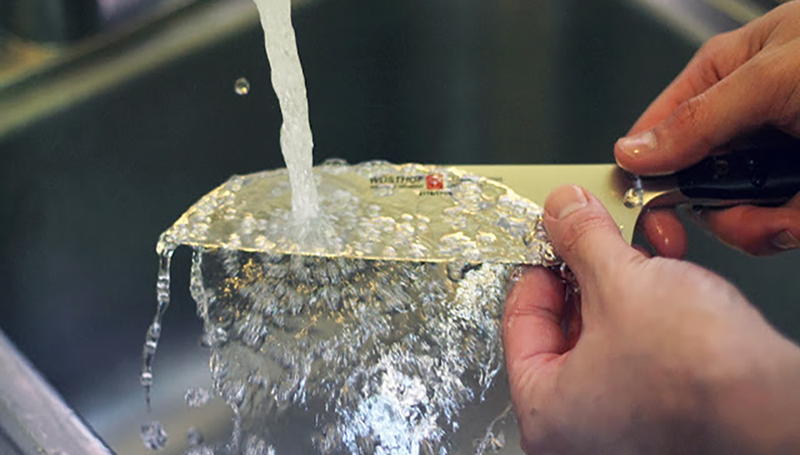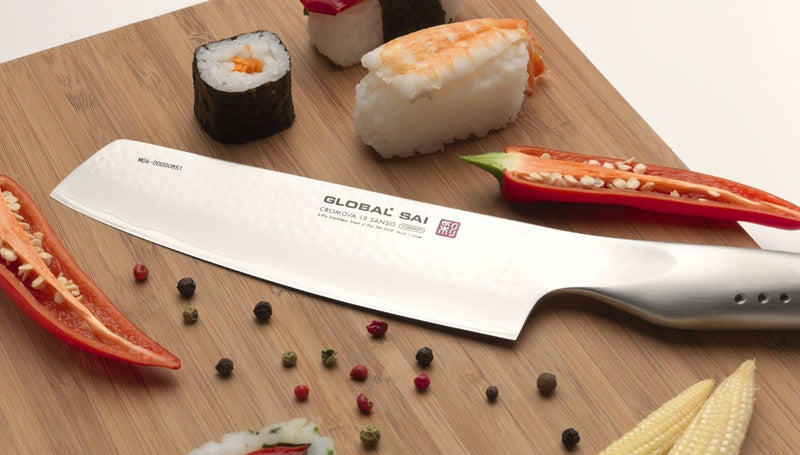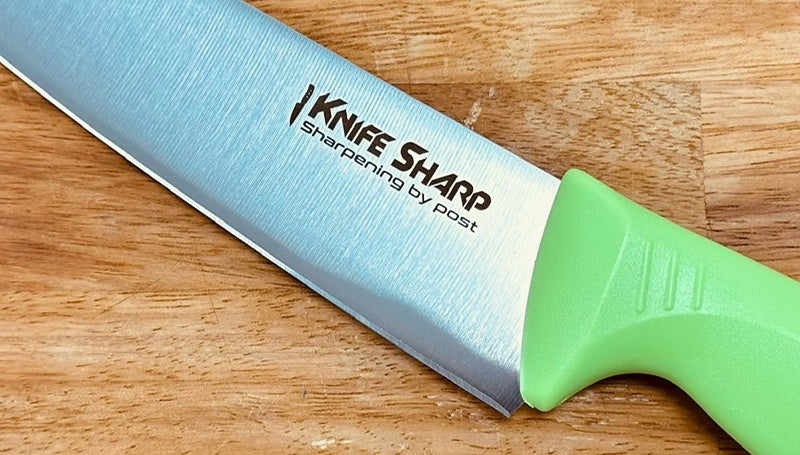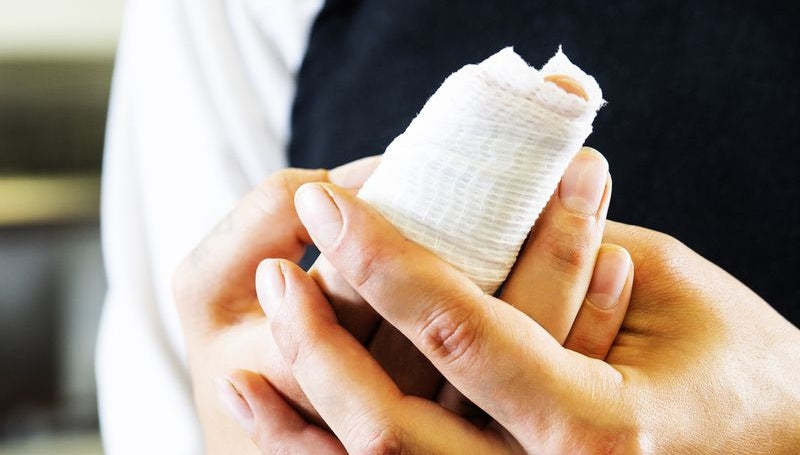FREE SHIPPING ACROSS THE UK
5 STAR CUSTOMER REVIEWS ⭐️⭐️⭐️⭐️⭐️
SHARPNESS GUARANTEED
FREE SHIPPING ACROSS THE UK
5 STAR CUSTOMER REVIEWS ⭐️⭐️⭐️⭐️⭐️
SHARPNESS GUARANTEED
Add description, images, menus and links to your mega menu
A column with no settings can be used as a spacer
Link to your collections, sales and even external links
Add up to five columns
Add description, images, menus and links to your mega menu
A column with no settings can be used as a spacer
Link to your collections, sales and even external links
Add up to five columns

How to look after your chef knives
May 13, 2020 4 min read
If you love cooking as much as we do you will know how much more enjoyable it is when you have sharp knives. Not only is it much safer, the feeling of effortlessly slicing through great ingredients is one of the highlights of preparing your own food. Nothing is worse than ripping and tearing your way through food preparation, making a complete mess of those amazing vegetables or meat you picked up from the local market.
So let’s says you’ve just had your knives returned from sending them us to get professionally sharpened. They come back amazing, shiny, and sharper than new. How do you look after them going forward?
Keeping them sharp
In an ideal world, you should be honing your knife before each use using a good quality diamond honing steel. This ensures it stays as sharp as possible while realigning the cutting edge. Honing doesn’t sharpen a blade it just cleans up the sharp cutting edge that is already there. Honing doesn’t replace sharpening, but it will prolong the sharpened cutting edge, increasing the time needed between professional sharpening.
Honing a knife is very much a skill and done incorrectly can damage the cutting edge in seconds requiring a professional sharpening to fix. Watch out for a future blog post on the correct technique.

Storing your knives
No knife is going to keep its sharp cutting edge if you throw it in a kitchen drawer full of other knives and utensils. The best place to store your sharp knives is in a soft wooden knife block, a magnetic wall-mounted rack, or if you do have to store them in a drawer make sure they are in its own compartment or divider tray to keep them away from other knives. If needed you can also use soft plastic edge guards to keep them safe. Our cardboard knife sleeves which are included in our knife sharpening service are good for this! However you store them make sure they are out of reach of little people.

The cutting surface
Nothing blunts a knife quicker than plastic, stone, steel, glass, or ceramic cutting boards, keep away from them at all costs! Some soft plastic cutting boards are ok, but very hard high-density ones are a sure-fire way to destroy the cutting edge. Also don’t use your knife cutting edge to scrape food of any type of cutting board, use the spine of the knife to get you food off the board and into your pan.
Treat yourself to a nice wooden chopping board or block. They are much kinder on the cutting edge of the knife as they have some give in them and are a joy to use compared to horrible hard cutting boards. Just make sure you keep them clean and disinfected for food hygiene purposes.

Cleaning your knives
Please don’t put your knives in the dishwasher, even if the manufacturer says it’s safe to do so. While it’s very tempting to do so the detergents and salts used in dishwashers are very abrasive and can corrode even the highest quality stainless or carbon steel. The high temperatures and humidity can damage the handles causing them to crack and warp. The rocking cleaning motion can cause banging against other cutlery/dishwasher trays which will damage cutting edges very quickly. How you should clean your knives is:
- Don’t let food dry on your knife, as it can be difficult to remove meaning you will have to scrub the knife which could damage the cutting edge, as well as cutting yourself. Acidic food can also corrode the knife if left on the blade.
- Only use warm soapy water in your sink, cleaning one knife at a time. Don’t let your knives soak at the bottom of a sink with other blades or utensils, this could cause them to bang into each other and damage the cutting edge. As well as increasing your chance of getting cut while fishing around for them!
- Always dry them straight away, don’t let them air dry on the draining board as this increases the chance for them to rust.

Using the knife for the wrong job
Don’t be using your kitchen knives to open that Amazon parcel or god forbid as a screwdriver! Using your kitchen knife to cut anything than food will cause the blade to blunt quicker, and possibly damage the knife by breaking the tip or putting large nicks in the blade.
Make sure you have enough knives to be able to use the correct knife for the correct job, and this goes for when cooking as well. Using a paring knife to chop through some bone is a big no-no! A nice set of 5 or 7 chef knives should give you a good choice for most jobs in the kitchen. If you do damage your blade don’t worry, we can fix it with our knife sharpening service.

So, there you go, you now know how to look after your knives to keep them sharp for as long as possible. When they do blunt send them to us to get them professionally sharpened and repaired, and then you can start looking after them again!
Stay Sharp!
Also in The 'Sharp' Blog

Identifying fake & counterfeit Global knives
May 01, 2024 3 min read
Here at Knife Sharp, we sharpen hundreds of Global knives every week. We love them as they are high quality and hold a fantastic sharp edge. However more recently we have been seeing more and more fake Global knives come to us...
Read More

New and Improved! Knife Sharp Chefs Knife
January 23, 2024 1 min read
We have been selling our specially designed Knife Sharp chefs knives for a good while now, with great feedback from our customers, but for 2024 we've decided to give it a bit of a upgrade! Our new knife is still specially designed and made for us...
Read More

Why Sharp Knives are Safe Knives!
August 18, 2023 2 min read
Here at Knife Sharp we often come across people saying they don’t want their knives sharpening as they feel like they will cut their fingers more often when using them. This is the exact opposite to what will happen! A sharp knife is a much safer knife, here’s why…
Read More
